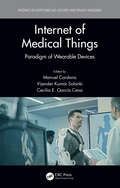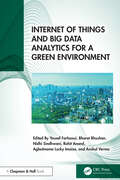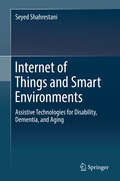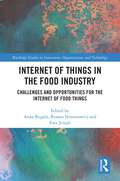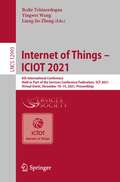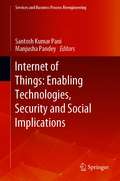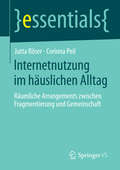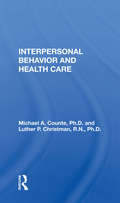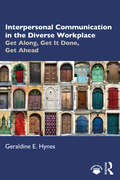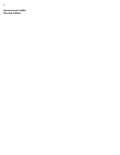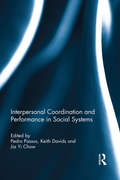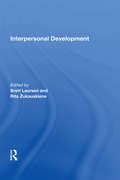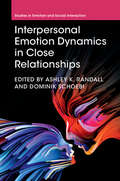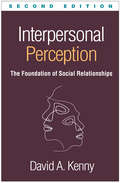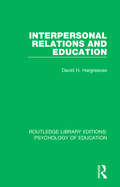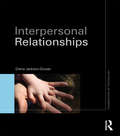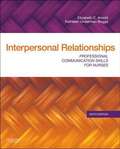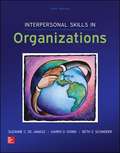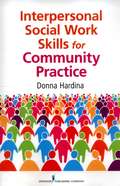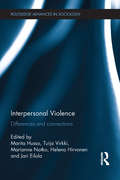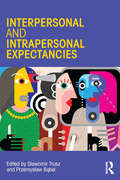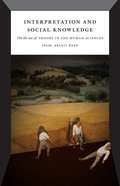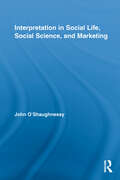- Table View
- List View
Internet of Medical Things: Paradigm of Wearable Devices (Internet of Everything (IoE))
by Vijender Kumar Solanki Manuel Cardona Cecilia E. GarcíaInternet of Things (IoT) has become a valuable tool for connection and information exchange between devices. This book provides a brief introduction to this new field, focuses on wearable medical devices, and covers the basic concepts by providing the reader with enough information to solve various practical problems. This book provides the latest applications, experiments, fundamentals concepts, and cutting-edge topics for the ehealth and wearable devices field. The book also offers topics related to Security in IoT and Wearable Devices, Wearable Devices and Internet of Medical Devices (IoMT), IoT for Medical Applications, and Tools and study cases. The book brings new and valuable information to PhD researchers, students, professors, and professionals working in IoT and related fields.
Internet of Things and Big Data Analytics for a Green Environment
by Bharat Bhushan Anshul Verma Yousef Farhaoui Agbotiname Lucky Imoize Nidhi Sindhwani Rohit AnandThis book studies the evolution of sustainable green smart cities and demonstrates solutions for green environmental issues using modern industrial IoT solutions. It is a ready reference with guidelines and a conceptual framework for context-aware product development and research in the IoT paradigm and Big Data Analytics for a Green Environment. It brings together the most recent advances in IoT and Big Data in Green Environments, emerging aspects of the IoT and Big Data for Green Cities, explores key technologies, and develops new applications in this research field.Key Features:• Discusses the framework for development and research in the IoT Paradigm and Big Data Analytics.• Highlights threats to the IoT architecture and Big Data Analytics for a Green Environment. • Present the I-IoT architecture, I-IoT applications, and their characteristics for a Green Environment. • Provides a systematic overview of the state-of-the-art research efforts.• Introduces necessary components and knowledge to become a vital part of the IoT revolution for a Green Environment.This book is for professionals and researchers interested in the emerging technology of sustainable development, green cities, and Green Environment.
Internet of Things and Smart Environments
by Seyed ShahrestaniThis book is focused on the Internet of Things (IoT) services and smart environments that can be of assistance to the elderly and individuals living with dementia or some sensory impairment. The book outlines the requirements of the systems that aim to furnish some digital sensory or cognitive assistance to the individuals and their caregivers. Internet of Things and Smart Environments: Assistive Technologies for Disability, Dementia, and Aging covers the important evolutions of the IoT, the sensors, actuators, wireless communication and pervasive computing systems, and other enabling technologies that power up this megatrend infrastructure. The use of the IoT-based systems in improving the conventional assistive technologies and provisions of ambient assisted living are also covered. The book takes an impartial, and yet holistic, view to providing research insights and inspirations for more development works in the areas related to assistive IoT. It will show the potentials of using normally available interactive devices, like smartphones or smart TVs, which can be supplemented with low-cost gadgets or apps to provide assistive capabilities. It aims to accentuate the need for taking a comprehensive and combinatory view of the comprising topics and approaches that are based on the visions and ideas from all stakeholders. The book will examine these points and considerations to conclude with recommendations for future development works and research directions. This book can be of value to a diverse array of audience. The researchers and developers in healthcare and medicine, aged care and disability services, as well as those working in the IoT-related fields, may find many parts of this book useful and stimulating. It can be of great value to postgraduate and research students working in these areas. It can also be adapted for use in upper-level classroom courses relevant to communication and smart technologies, IoT applications, and assistive technologies. Many parts of the book can be of interest to the elderly and individuals living with a disability, as well as their families and caregivers. From an industry perspective, it can be of interest to software, hardware, and particularly app developers working on the IoT applications, smart homes and environments, and assistive technologies for the elderly and people living with disability or dementia.
Internet of Things in the Food Industry: Challenges and Opportunities for the Internet of Food Things (Routledge Studies in Innovation, Organizations and Technology)
by Anna RogalaThe food industry is experiencing a digital transformation across the entire supply chain, from farm to fork. This book offers comprehensive insights into the challenges and opportunities faced, specifically examining the application of the Internet of Things. The authors analyse the benefits and the related threats from the perspective of the participants of the entire supply chain, including consumers. Taking the reader on a journey, this book begins with an analysis of technology use in farming, production, logistics and retailing before delving into the use of digitalization in educating consumers on sustainable consumption practices. The multifaceted analysis of the Internet of Food potential combines science and practice, enriching theoretical analysis with case studies. This book will be of interest to those researching and studying supply chain management, logistics, innovation and technology management and consumption, with a particular interest in the food industry.
Internet of Things – ICIOT 2021: 6th International Conference, Held as Part of the Services Conference Federation, SCF 2021, Virtual Event, December 10–14, 2021, Proceedings (Lecture Notes in Computer Science #12993)
by Bedir Tekinerdogan Liang-Jie Zhang Yingwei WangThis book constitutes the proceedings of the 6th International Conference on Internet of Things, ICIOT 2021, held virtually as part of SCF 2021, during December 10-14, 2021. The 8 full papers presented in this volume were carefully reviewed and selected from numerous submissions. The conference Internet of Things (ICIOT 2021) covers state-of-the-art technologies and best practices of Internet of Things, as well as emerging standards and research topics which would define the future of Internet of Things.
Internet of Things: Enabling Technologies, Security and Social Implications (Services and Business Process Reengineering)
by Santosh Kumar Pani Manjusha PandeyThis edited book presents point of view and the work being undertaken by active researchers in the domain of IOT and its applications with societal impact. The book is useful to other researchers for the understanding of the research domain and different points of views expressed by the experts in their contributed chapters. The contributions are from both industry and academia; hence, it provides a rich source of both theoretical and practical work going on in the research domain of IOT.
Internetnutzung im häuslichen Alltag: Räumliche Arrangements zwischen Fragmentierung und Gemeinschaft (essentials)
by Jutta Röser Corinna PeilDer Beitrag präsentiert aktuelle Befunde zur Internetnutzung im häuslichen Alltag. Die Autorinnen nehmen zunächst eine Systematisierung alltagsbezogener Rezeptionsforschung der Cultural Studies vor und führen den Domestizierungsansatz ein. Auf Basis ethnografisch orientierter Haushaltsstudien wird anschließend aufgezeigt, auf welche Weise Internetnutzung, räumliche Arrangements und häusliche Kommunikationsstrukturen miteinander interagieren. Abschließend werden verschiedene Arrangements beschrieben und deren Einflüsse auf die Herstellung von Gemeinschaft und Fragmentierung, auf geschlechtsgebundene Praktiken sowie auf Funktionen anderer Medien, insbesondere des Fernsehens, skizziert.
Interorganisationale kollaborative Gemeinschaftsforschung: Forschungscampus für den Automobilbau der Zukunft: ARENA2036 (ARENA2036)
by Roeland HoogeveenWie verhalten sich Spitzenkräfte aus Universität, Forschungseinrichtungen und Industrie unter einem Dach? Wie entstehen Ideen, was fördert die Kreativität, wie bringt man die Ergebnisse schnell aus der Forschungsfabrik in die industrielle Produktion? Diese und angrenzende Fragen werden in diesem Forschungsbericht beantwortet.Im Querschnittsbereich der ARENA2036 wurde die spezielle Arbeitsumgebung – die Forschungsfabrik – arbeitswissenschaftlich fundiert ausgestaltet. In diesem Buch werden die resultierenden Analysen und Reflexion vorgestellt. Ferner werden Methoden dargestellt, um die Technologie- und Produktentwicklung besser aufeinander abzustimmen. Ergebnisse zur interdisziplinäre Zusammenarbeit innerhalb der ARENA2036 werden diskutiert und daraus ein Ansatz zur beschleunigten Verbreitung der benötigten Kompetenzen entwickelt, die zur Nutzung grundlegend neuer Technologien benötigt werden.
Interpersonal Behavior And Health Care
by Michael A. CounteHealth care professionals are continually puzzled by people who come to their offices showing no symptoms of physical illness. They are also hard pressed to understand those who, in the face of obvious need of medical help, refuse to seek help. This textbook delves into how interpersonal processes influence the origins, functions, and change of health-related beliefs and attitudes. The authors address such questions as: Why do so many people with nonorganic complaints seek medical aid? Why do so many other people delay getting help despite the presence of medically serious symptoms? How are social networks, such as lay referral systems, linked to the use of medical services? What constitutes the cluster of attitudes called "patient satisfaction," and how are those attitudes related to actual behavior during treatment (for example, compliance with medical instructions)? What do field experiments suggest with regard to modifying health beliefs and attitudes?
Interpersonal Communication in the Diverse Workplace: Get Along, Get It Done, Get Ahead
by Geraldine HynesForegrounding the vital importance of interpersonal communication and cultural competence in the workplace, this book offers concise, practical strategies for daily communication in a global business environment. The workplace is steadily becoming more diverse, and cultural competence is widely recognized as a key to success, in terms of revenue, profit, market share, and workforce productivity. This and diversity appreciation are the two cornerstones for effective interpersonal communication, facilitating relationship development, improving job satisfaction, commitment, loyalty, and trust, and leading to performance and organizational success. The effectiveness of diversity training sessions and cultural guidebooks can vary – business professionals need a book that presents more than descriptions of culture-bound business practices or prescriptions for valuing diversity. This book is that practical solution, presenting a conceptual model along with tools to put it to work from day one, including cases and examples. With its strategies for reducing diversity miscues, techniques for responding in uncomfortable conversations, and innovative ways to bridge cultural gaps, this book will help current and aspiring leaders across industries build rapport and promote constructive behaviors in a diverse work environment, resulting in organizational success.
Interpersonal Conflict
by Keith Berry Joyce Hocker William WilmotInterpersonal Conflict 11e examines the central issues that inform conflict and, in turn, make readers’ personal and professional lives challenging and fascinating. With new cases and applications that reflect cultural changes that shape the ways people move through conflict, this new edition invites readers to reflect on, and better understand, conflict as it pertains to the unique vantage points of their lived experience.
Interpersonal Coordination and Performance in Social Systems
by Keith Davids Pedro Passos Jia Yi ChowInterpersonal coordination is an important feature of all social systems. From everyday activities to playing sport and participating in the performing arts, human behaviour is constrained by the need to continually interact with others. This book examines how interpersonal coordination tendencies in social systems emerge, across a range of contexts and at different scales, with the aim of helping practitioners to understand collective behaviours and create learning environments to improve performance. Showcasing the latest research from scientists and academics, this collection of studies examines how and why interpersonal coordination is crucial for success in sport and the performing arts. It explains the complex science of interpersonal coordination in relation to a variety of activities including competitive team sports, outdoor sports, racket sports, and martial arts, as well as dance. Divided into four sections, this book offers insight into: the nature, history and key concepts of interpersonal coordination factors that influence interpersonal coordination within social systems interpersonal coordination in competitive and cooperative performance contexts methods, tools and devices for improving performance through interpersonal coordination. This book will provide fascinating insights for students, researchers and educators interested in movement science, performance analysis, sport science and psychology, as well as for those working in the performing arts.
Interpersonal Development (The\international Library Of Psychology Ser.)
by Rita ZukauskieneThis volume brings together for the first time the papers which have shaped and defined the field of interpersonal development. It celebrates the maturation of the subject by bringing together the best work by scholars who have been instrumental in furthering the field. The twenty-seven essays describe developmental changes in interactions within specific close relationships, covering parent-child relationships, friendships and peer relationships, romantic and spousal relationships, and sibling relationships. They also detail characteristics of specific relationships and interconnections among these key features, as well as tying close relationships to individual outcomes. The essays are accompanied by an introduction which offers a brief history of the field, a review of relationship definitions and a detailed preview of the articles.
Interpersonal Emotion Dynamics in Close Relationships (Studies in Emotion and Social Interaction)
by Ashley K. Randall Dominik SchoebiEmotions play a powerful role in close relationships. Significant progress has been made in understanding the temporal features of emotions associated with the development and maintenance of close relationships across the lifespan. This advancement has revealed further questions: which theories help conceptualize interpersonal emotion dynamics? What are the ways researchers can assess and model these dynamics? How do interpersonal emotion dynamics manifest in different close relationships? And do these emotion dynamics contribute to the maintenance or dissolution of relationships? Interpersonal Emotion Dynamics in Close Relationships addresses these and other questions by bringing together state-of-the-art perspectives from scholars widely recognized for their contributions to the study of emotions in relationships. Each chapter defines interpersonal emotion dynamics, reviews methodological or empirical work, and offers important directions for future research. This volume will be a valuable resource for students, researchers, and practitioners interested in understanding the role of emotions in relationships.
Interpersonal Perception, Second Edition: The Foundation of Social Relationships
by David A. KennyPeople make judgments about others all the time, often without realizing they are doing so. How are interpersonal impressions formed? How accurate are our perceptions of other people's traits--and our own? In this major revision of his landmark work, David A. Kenny provides a reader-friendly examination of these and other critical questions, identifying key components that shape impressions and their accuracy. Topics include how to estimate perceiver, target, and relationship effects; the extent to which different perceivers see a target in the same way; the impact of group membership and stereotypes; and whether others see us as we see ourselves. Implications for interpersonal relationships and social behavior are highlighted. New to This Edition *Virtually a new book; incorporates 25 years of theoretical, empirical, and methodological advances. *New and greatly expanded topics, including first impressions, individual differences in accuracy, implicit measures, and narcissism. *Grounded in a reformulated conceptual model. *More accessible--uses nontechnical language, humor, popular culture, and simplified figures to elucidate complex ideas. *End-of-chapter "Practical Suggestions" apply the science to real-world social situations.
Interpersonal Relations and Education (Routledge Library Editions: Psychology of Education)
by David H. HargreavesOriginally published in 1972, this title provides an analysis of social interactions in educational contexts and opens up the field of the social psychology of education as an area in its own right at the very heart of the process of education. From a ‘symbolic interactionist’ perspective, the author develops a framework for the study of relations between teachers and pupils, discussing the basic ways of analysing social interaction, including the concepts of perception and role. He examines the distinctive perspectives of teachers and pupils on their relationships, bringing together into a coherent framework the insights of such writers as John Holt and Carl Rogers, and within this context he explores the notion of ‘voluntary schooling’. The book also deals with other important aspects of education such as discipline, classroom group dynamics and the relations between headteachers and their staff. The theories put forward by the author are firmly grounded in the daily experience of teachers and pupils in the classroom at the time. The book was expected to be of value to experienced teachers and student teachers alike, as well as to teachers of the social sciences in general.
Interpersonal Relationships (Foundations of Psychology)
by Diana Jackson-DwyerWith a more specific focus than the all-encompassing textbook, each title in the Foundations of Psychology series enables students who are new to psychology to get to grips with a key area of psychological research, while also developing an understanding of basic concepts, debates, and research methodologies. In this book Diana Jackson-Dwyer presents an introductory survey of classic and recent research on relationships and the theories that underpin them. The book starts with a brief overview of the place of relationships within the history of psychology and of their evolutionary roots: our need to belong, to attach and to affiliate. After a look at methodology, it considers different types of relationships: kinship, friendship, loving and mating. Theories are advanced to explain the formation, maintenance and breakdown of relationships. The book draws on a wide array of contemporary research, and covers issues ranging from rising divorce rates to cultural variations in mating patterns, the issue of gay marriage, and the effect of the internet on relationships. Each chapter contains numerous pedagogical features which will help students to engage with the material: Chapter-specific learning objectives and summaries of key points Study boxes presenting reflective exercises, research questions, and issues for discussion Glossaries and suggestions for further reading Assuming no prior knowledge of the subject, Interpersonal Relationships provides an accessible and up-to-date overview of this vibrant area of psychology. The book will be ideal reading for students who are new to higher-level study - whether at school, college or university, and will also be useful for first-year undergraduate students taking introductory courses in psychology.
Interpersonal Relationships: Professional Communication Skills for Nurses
by Rn Kathleen Underman Boggs Elizabeth C. Arnold Pmhcns-Bc Fnp-CsEffective communication with clients, families, and professional colleagues starts here! With Interpersonal Relationships: Professional Communication Skills for Nurses, 7th Edition, you'll see how good communication skills can lead to achieving treatment goals in health care. Clear guidelines show how you can enhance the nurse-client relationship through proven communication strategies as well as principles drawn from nursing, psychology, and related theoretical frameworks. And you'll see how to apply theory to real-life practice with case studies, interactive exercises, and evidence-based practice studies. A two-time winner of the AJN Book of the Year award, this book is updated to emphasize interdisciplinary communication and QSEN competencies. From expert nursing educators Elizabeth Arnold and Kathleen Underman Boggs, this comprehensive, market-leading text is unmatched for helping nurses develop effective communication skills! Interactive exercises offer the opportunity to practice, observe, and critically evaluate your professional communication skills in a safe learning environment. Practical guidelines describe how to modify communications strategies for various populations and situations including children, the elderly, end of life, clients with special needs, health teaching, stress, crisis, and professional colleagues. Case examples help you develop empathy for clients' perspectives and needs. Nursing, behavioral, developmental, family, and communication theories provide an essential foundation and a theoretical perspective for effective communication. Learning objectives, chapter overviews, and a detailed glossary focus your study and help you absorb and retain key content. NEW! A greater emphasis on communication, interdisciplinary theory, and interprofessionalism includes a focus on the nursing paradigm, nursing discipline, and ways of knowing. NEW! Focus on QSEN competencies reflects current thinking on technology, safety, and evidence-based practice, especially as they relate to communication in nursing. NEW! Discussion questions at the end of each chapter encourage critical thinking. NEW! Clarity and Safety in Communication chapter addresses topics such as huddles, rounds, handoffs, SBAR, and other forms of communication in health care.
Interpersonal Skills In Organizations (Fifth Edition)
by Suzanne C. De Janasz Karen O. Dowd Beth Z. SchneiderInterpersonal Skills in Organizations by de Janasz, Dowd, and Schneider takes a fresh, thoughtful look at the key skills necessary for personal and managerial success in organizations today. Exploding with exercises, cases, and group activities, the book employs an experiential approach suitable for all student audiences. The book is organized into 4 distinct sections (Understanding Yourself, Understanding Others, Understanding Teams, and Leading) that can be used collectively or modularly depending on the instructors' preferences and students' needs. The emphasis in this edition focuses on making the text more current along with making the text pedagogically effective for students and instructors.
Interpersonal Social Work Skills For Community Practice
by Donna HardinaSpecifically dedicated to the "skills" that social workers need to advance community practice, this creative book is long overdue. Grounded in the wisdom and evidence of well-honed interpersonal social work skills. . . Donna Hardina's new text takes community practice to a higher level than ever before developed in book form; indeed she displays the most thorough understanding of research on community practice that I have read in any community practice text.
Interpersonal Violence: Differences and Connections (Routledge Advances in Sociology)
by Marita Husso, Tuija Virkki, Marianne Notko, Helena Hirvonen and Jari EilolaFrom early modernity to today, society has encountered various forms of interpersonal violence. Through exploration of particular areas within Europe and Russia to Africa, America and Asia, this collection presents both differences and connections among various forms of interpersonal violence in different times, places, institutional orders and relationships. Interpersonal Violence introduces research results from studies in various disciplines, such as history, sociology, social policy social work, cultural studies, and gender studies. In focusing on the diverse and often ignored social locations and cultural backgrounds of interpersonal violence, the book demonstrates 1) how the specificity of temporality and spatiality affect the manifestation of violence, 2) how the dynamics of intersectional and institutional differences are located in social space and time, and 3) how the different forms of violence in different times are affectively, conceptually and discursively connected. With its comprehensive and integrative approach, this book is a key tool book for understanding the phenomenon and cultural conceptions of interpersonal violence. It would be most suitable for upper level undergraduates, graduates doctoral students interested in social sciences, history, criminology, psychology, cultural studies, education, gender studies and public health.
Interpersonal and Intrapersonal Expectancies
by Sławomir Trusz Przemysław BąbelDo our expectancies about ourselves and about others have any effect on our actual experiences? Over fifty years of research studies suggest not only that this is the case, but also that our expectancies can shape other people’s experience in different contexts. In some cases they can help, but other times they can do harm instead. Interpersonal and Intrapersonal Expectancies provides a theory, a research review, and a summary of the current knowledge on intra- and interpersonal expectancy effects and related phenomena. Based on extensive study, and written by eminent experts from some of the world’s leading academic institutions, the book presents the most recent knowledge on social and psychological mechanisms of forming both intra- and interpersonal expectancies. It also considers how expectancies are sustained and what their consequences are, as well as discussing the latest theoretical concepts and the most up-to-date research on expectancy effects. This book represents the first review of the phenomenon of interpersonal expectancies in over 20 years, and the only publication presenting a complementary view of both intra- and interpersonal expectancies. It aims to open up a discussion between researchers and theoreticians from both perspectives, and to promote an integrative approach that incorporates both.
Interpretation and Social Knowledge: On the Use of Theory in the Human Sciences
by Isaac Ariail ReedFor the past fifty years anxiety over naturalism has driven debates in social theory. One side sees social science as another kind of natural science, while the other rejects the possibility of objective and explanatory knowledge. Interpretation and Social Knowledge suggests a different route, offering a way forward for an antinaturalist sociology that overcomes the opposition between interpretation and explanation and uses theory to build concrete, historically specific causal explanations of social phenomena.
Interpretation and Social Knowledge: On the Use of Theory in the Human Sciences
by Isaac Ariail ReedFor the past fifty years anxiety over naturalism has driven debates in social theory. One side sees social science as another kind of natural science, while the other rejects the possibility of objective and explanatory knowledge. Interpretation and Social Knowledge suggests a different route, offering a way forward for an antinaturalist sociology that overcomes the opposition between interpretation and explanation and uses theory to build concrete, historically specific causal explanations of social phenomena.
Interpretation in Social Life, Social Science, and Marketing (Routledge Interpretive Marketing Research)
by John O'Shaughnessy'Interpretation' is used as an umbrella for bringing together a wide range of concepts and developments in the philosophy of social science that provide the foundation for clear thinking about social phenomena. In his new book, John O’Shaughnessy familiarises the reader with the nature of interpretation and its importance in social life, decision making in social science enquiries and consumer marketing, thus offering a multidisciplinary approach to problems of bias and uncertainty. Thus, this book is novel in its outlook and comprehensive in its approach. Whereas past studies in interpretation have focused on hermeneutical methods, O’Shaughnessy goes further considering the role of interpretation in social interactions, in undertaking scientific work, in the use of statistics, in causal analysis, in consumer evaluations of products and artifacts and in interpreting problematic situations together with the corresponding biases arising from emotional happiness and the concepts employed.
